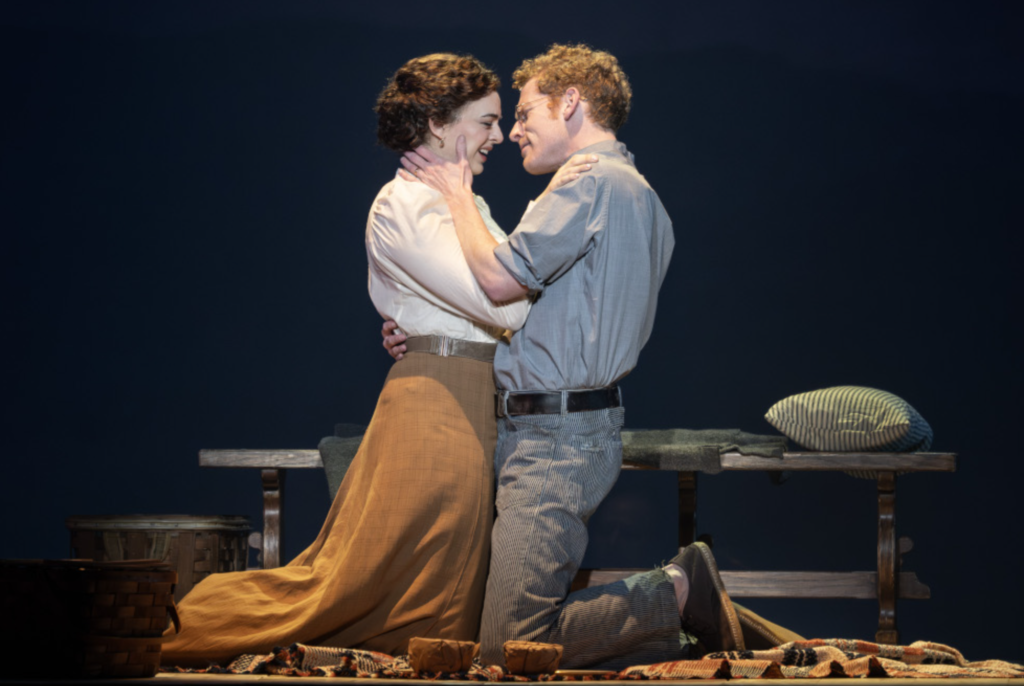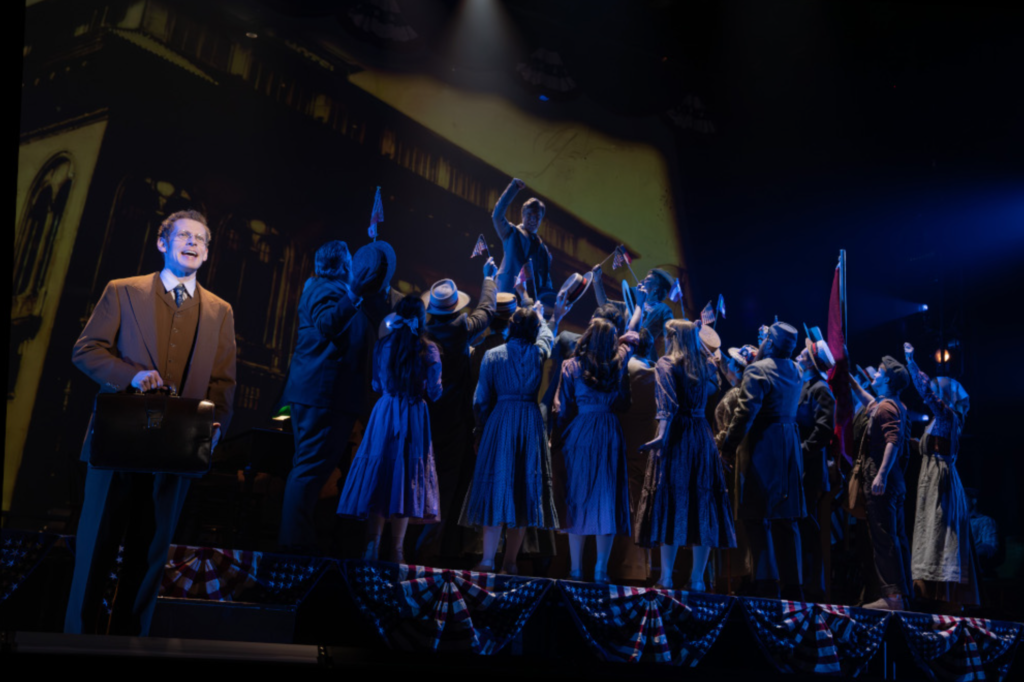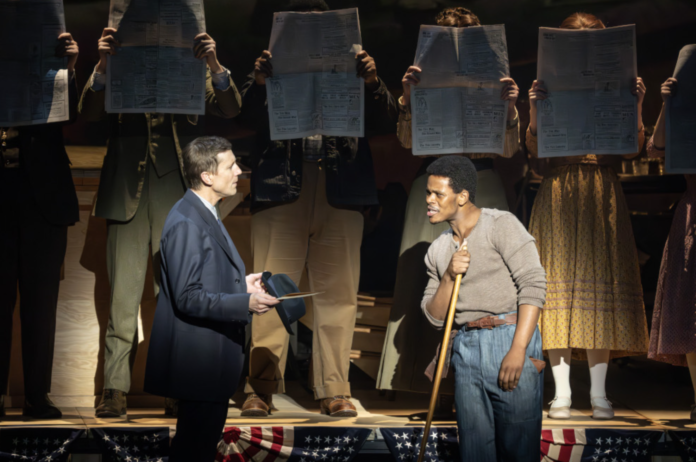When the musical Parade (through June 8 at the Orpheum Theatre) premiered in 1998, it came at the tail-end of a tumultuous decade that everyone revisions as innocuous. Despite what reruns of Friends might have you believe, those of us who were alive in the ‘90s (particularly, those of us from marginalized groups) recall every great stride of the Clinton era being tempered with an equal-if-not-greater setback.
The ‘90s were the decade when every Pedro Zamora coming out of the closet was followed by a Matthew Shepard left for dead on a fence; when all the advancements made by Black folks in pop culture were countered by the Rodney King beatings, three strikes laws, and the OJ Simpson trial to counter the “unified America” narrative. No matter how much I love rewatching Living Single, it won’t erase memories of the decade’s resurgence of skinheads and the Klan.
With that kind atmosphere, it’s no wonder Harold Prince commissioned songsmith Jason Robert Brown and playwright Alfred Uhry for this piece about how easy it is for “polite” society to bring their biases to the fore. Most of the decade’s popular media either refused to acknowledge inequality or resorted to victim-blaming (think of every movie or sitcom from the era that turned feminists and racial equality advocates into straw people). Drawing on a real-life story of a Jewish man scapegoated for a heinous murder, Prince drew parallels to ‘90s United States akin to 1950s Arthur Miller’s depictions of the Salem Witch Trials and McCarthyism.

Having said that, Miller’s The Crucible (in which I’ve performed) remains admirable in both a narrative and proverbially lyrical sense. Parade remains a high point of Brown’s musical gifts, but the decades have revealed a few noticeable flaws in Uhry’s dramatization.
After a brief Confederate prelude in 1863, our story proper begins circa 1913. Jewish Brooklynite Leo Frank (Max Chernin) lives in Marietta, Georgia with his locally born wife Lucille (Talia Suskauer). Leo’s not a fan of the Georgian atmosphere, be it the eternally-humid weather or reverence for the Confederacy. Still, his love for Lucille and commitment to hard work have earned him the role of director of the National Pencil Company.
Leo’s general discomfort with his new home turns into full-fledged terror when one of his employees, teenaged Mary Phagan (Olivia Goosman) is found brutally murdered on the factory floor. It doesn’t take long for Leo to be singled out as the prime suspect, despite there being no evidence that he killed her.
That doesn’t matter much to the locals of Marietta, including the governor (Chris Shyer). They all want to see someone hang for Mary’s murder, and a Yankee Jew makes the perfect target for their unified rage.
There’s so much about this musical that just works perfectly. The prelude does a fine job establishing how a Southern upbringing is nearly inextricable from Confederate pride. Though well-educated folks will bristle at the very thought of the pro-slavery South being victims in any conceivable sense, the prelude establishes a serf-like belief in an imperialist cause that was so central to the laypeople who give their lives for its principles.
Such context puts us in the mindset of not just the mob who will later decide Leo’s fate, but also the mind of Lucille, who is dismissive of the couple’s Black maid and couldn’t imagine living someplace where the stars ‘n bars didn’t fly high. Leo himself can hardly believe he’s married a woman proud to be both “a Jew and a Southerner”.
Brown’s Tony-winning songs remain as vivid and captivating as they’ve ever been, never causing the action to drag, yet distinguishing themselves despite common Broadway tropes between each and every note and lyric. Prince tried in vain to get Stephen Sondheim to handle to music for his show, and the late composer’s influence is evident in his choice of successor. Not that Brown’s songs seem derivative—but they take a clear advantage of Sondheim’s philosophy of a song needing to take the audience from one story point to the next.
The cracks begin to show with how Uhry depicts anti-Semitism, or rather, the lack thereof. Although Leo self-identifies as Jewish quite often, it’s almost a non-issue in Uhry’s script. At face value, one would think that the redneck population of Marietta despises Leo simply for being a Yankee, that he’d do better to get off his NY high horse, even if his comeuppance is an extreme one. Racism and ethnic bias have very little presence for this being a play about a town where Confederate Memorial Day is a central set piece. Today’s audiences might know of the anti-Semitism the real Leo Frank faced, or they might catch the one or two instances when the Mariettans do focus on his Judaism, but there’s no real sense of that anti-Jewish bigotry in the play before the plot begins.
Still, tour director Michael Arden brings a fine staging of the musical that’s both grounded and aethereal. Dane Laffrey’s set is designed an almost monolithic platform surrounded by pews. One side looks sort of like a classroom and the other a church. At the start of the show, one wonders how they’ll move everything around in order to get anything done. To the viewer’s surprise, not much is shifted. Arden’s direction and the choreography of Lauren Yalango-Grant and Christopher Cree Grant turn a seemingly-finite amount of space into an open area that the cast maneuvers with fluid grace. Inspired choices—like having the incarcerated Leo spend all of intermission pacing atop the platform to represent his cell—make the show a compelling watch.

As is typical of the Orpheum, the old-school HVAC system was serviceable. There weren’t that many masks compared to shows I’ve seen lately, but I have to wonder if that’s due to growing indifference on the part of audience members, or reflective of the house not being full on opening night? In any case, CO² readings on my Aranet4 peaked at 1,308ppm by the end of the two-act show.
The topic covered in Parade is just a relevant today as it was when the musical was first staged. It’s a sobering reminder of the biases inherent to American culture, and the violence that inevitably results from forgetting they exist. And yet, the book seems utterly determined to treat prejudice with an odd indifference that contradicts the show’s very reason for existing.
It’s one thing to focus on the enduring love of its lead couple and the kangaroo court mechanics of mob justice, but it’s another to constantly tiptoe around the gross discrimination that makes those other factors so powerful. In an odd way, doing so makes Parade more a product of its era that one would guess at first glance.
Fortunately, excellent songs, interesting staging, and strong performances stand the test of time. This touring production of Parade certainly has those.
PARADE runs through June 8. Orpheum Theatre, SF. Tickets and more info here.





